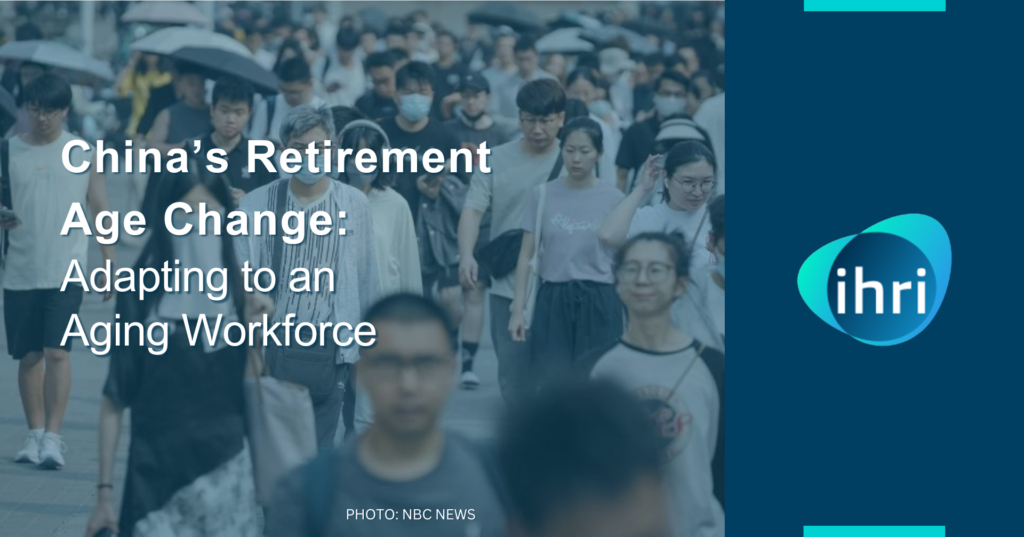The workforce dynamics of one of the world’s largest economies, China, are on the brink of significant change. Starting next year, China will begin implementing a gradual increase in its retirement age, a necessary reform to address the dual challenges of a shrinking population and an aging workforce. Currently, China has one of the youngest retirement ages among major global economies, but as demographic shifts become increasingly pressing, this long-anticipated policy change is finally on the horizon.
The Current Retirement Age and Why It’s Changing
As of today, China’s official retirement age for men is 60, while for women, it is 55 for civil servants and 50 for most other workers. This system was set in place in the 1950s, a time when life expectancy was much lower and the country had a much larger, younger population base. Fast-forward to the 2020s, and China now faces a rapidly aging population, which is estimated to see one-third of its citizens aged 60 or above by 2050, according to projections by the United Nations.
China’s current retirement age lags behind many other major economies:
- Japan: 65 (and planning to increase further)
- United States: 66, moving towards 67
- Germany: 67
- France: 64 after a recent reform
Key Drivers Behind the Retirement Age Reform
- Aging Population: In 2022, China’s population shrank for the first time in 60 years. The country’s birth rate fell to 6.77 births per 1,000 people, the lowest level since records began in 1949. By 2035, it’s projected that China will have more than 400 million people over the age of 60, accounting for nearly 30% of its total population. Without reform, the increasing burden on the social security system could become unsustainable.
- Workforce Decline: As the population ages, the working-age population is declining, with the number of people aged between 15 and 59 shrinking by around 35 million over the last decade. This has led to concerns about a shortage of labor, which is critical for maintaining China’s status as a manufacturing powerhouse.
- Economic Pressure: The shrinking working-age population will inevitably put pressure on China’s pension system, which is already grappling with a large number of retirees and fewer workers to fund the system. According to government data, China’s pension fund could face a shortfall of around 8 trillion yuan ($1.2 trillion) by 2035 if no changes are made.
Global Context: Comparing Retirement Ages
China’s move to raise its retirement age is not an isolated event; many other countries facing similar demographic challenges have already implemented reforms or are in the process of doing so. For example:
- Germany has been gradually raising its retirement age from 65 to 67 since 2012.
- France recently raised its retirement age to 64, despite facing widespread protests.
- Japan has increased its retirement age to 65 and is considering further extensions as part of its strategy to manage its aging society.
Potential Impact on the Workforce and Economy
For businesses and HR professionals, this policy change presents both opportunities and challenges. Here’s what to expect:
- Retaining Talent: Older workers often bring a wealth of experience and knowledge to their roles. Extending their careers can help companies retain critical institutional knowledge, which could be beneficial in sectors that require highly specialized skills.
- Skills Development: As people work longer, there will be an increased demand for upskilling and reskilling programs to ensure older workers can adapt to technological advancements and changes in the job market.
- Pension and Benefit Adjustments: Companies may need to revisit their pension plans, employee benefits, and long-term career planning to align with the new retirement age policy.
Conclusion
China’s decision to raise its retirement age is a critical step toward mitigating the effects of its shrinking workforce and aging population. For HR professionals, it signals a need to adapt and implement strategies to accommodate an older workforce, including career development, health and wellness programs, and revised compensation structures. The global HR community will be watching closely as this reform unfolds, offering important lessons for other countries facing similar demographic challenges.
Becoming an Expert
International HR Institute provides global certification programs for modern-day HR professionals. Understand how future payroll processes and systems can impact your workforce by taking the Certified Compensation and Benefits Professional certification program.


